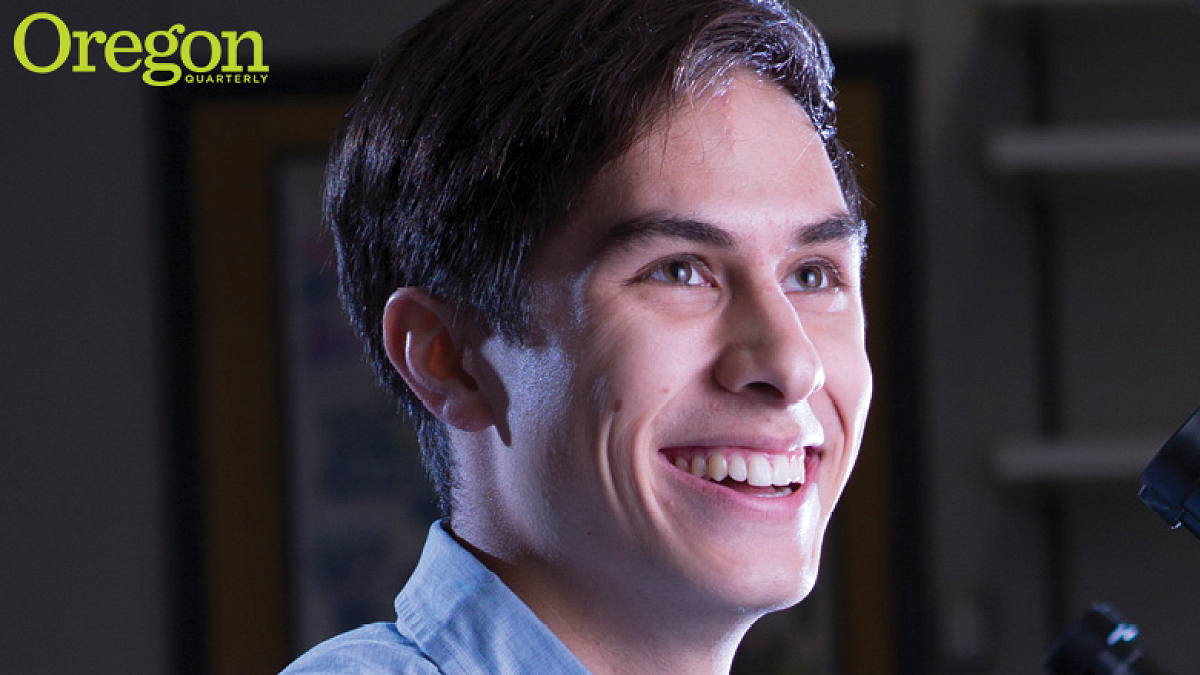Austin Wong doesn’t waste time. At age 16, the high school valedictorian from Salem started at the University of Oregon as a Presidential Scholar and PathwayOregon award recipient. During spring break of his freshman year, he traveled with fellow UO undergraduates to Honduras, where they helped poor families build safe, fuel-efficient stoves—a transformative experience that sparked his interest in health care.
“That was the beginning for me,” says Wong. He immediately began exploring how science can help people—a passion that would eventually lead the 2015 biology graduate to a career with Epic Systems, a Wisconsin-based health-care software company.
Shortly after returning from Honduras, Wong and his roommate dreamed up Oregon Medical Brigades, a service program that sent UO students to Panama to set up medical clinics for needy communities. During his sophomore year, he met Josh Snodgrass, director of the UO’s Global Health Biomarker Laboratory.
“Austin was smart and motivated,” recalls Snodgrass. “He clearly wanted to make a difference in the world.” Snodgrass put him to work on a common task for rookies in the lab—thawing spit.
Snodgrass develops innovative, but simple, methods to gather health-related data in remote locations where labs and clinics are not readily available (for instance, using a small tube of saliva or a drop of blood). These techniques enable research on impoverished communities.
Wong thawed tubes of saliva that had been frozen at –112 degrees Fahrenheit—repetitive, painstaking work. The tubes must stay upright in the water bath. That water has to be just the right temperature. And then there’s the smell. The stench from one tiny vial can fill a room.
“It sounds simple,” says Snodgrass, “but there are many ways to mess it up. I always pay attention to how well people do at this technical level—and whether or not they complain about it.”
Wong did well, so Snodgrass gave him more responsibilities. But these were just the first steps of the journey.
“Once they learn the technical skills, undergraduate researchers become part of a team,” says Snodgrass. “That’s when they start to learn the more subtle, challenging aspects of research, like communication, flexibility, creativity, and collaboration.”
For his thesis for the Robert D. Clark Honors College, Wong led a study of body composition that was part of a World Health Organization project on aging. That’s when he encountered his greatest challenges.
“The goal was for him to become more independent, and that’s what he did,” says Snodgrass. “I distinctly remember the moment it hit him—how hard and open-ended research can be. He was overwhelmed, but he didn’t run away. He grew a great deal in a very short amount of time.”
Today, Wong is the primary contact for clients using Epic’s Healthy Planet product, which helps hospitals, clinics, and other health-care organizations track data. For example, if patients are going to multiple clinics, the software gives doctors a comprehensive picture of the patient’s medication and treatments.
“As payment models continue to shift from fee-for-service to value-based care, these tools become increasingly important in enabling organizations to improve both clinical and financial outcomes,” says Wong.
“As a student, I was enthusiastic about public health issues and improving lives. I thought it would be life-changing to improve the health outcomes of even just one person. But I always wondered what could be done to scale those efforts up from a single person to a larger population. As a company, Epic can identify, understand, and take action on that larger population without losing sight of the individual.”
—By Ed Dorsch, BA ’94 (English, sociology), MA ’99 (journalism), University Communications


